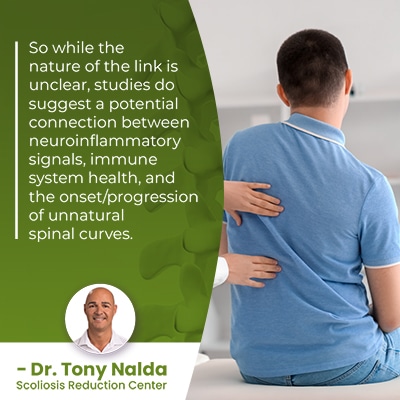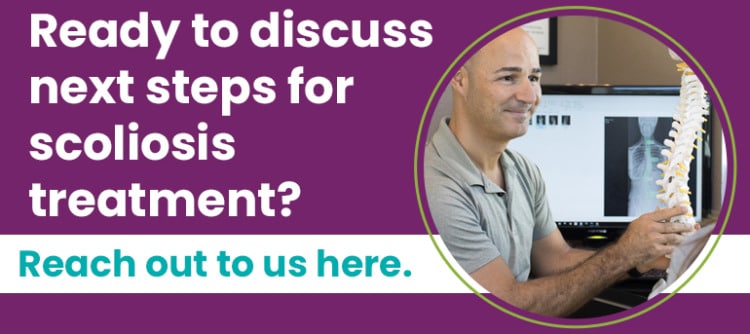Can Scoliosis Weaken Your Immune System? [ANSWERED]

Although scoliosis is a spinal condition, its effects aren't solely isolated to the back. As the brain and spinal cord work together to form the body's central nervous system (vast communication network), spinal conditions can cause a number of seemingly-unrelated symptoms. The best way to avoid scoliosis weakening the immune system, and other related complications, is to be proactive with treatment.
While a direct link between scoliosis and a weakened immune system is unclear, scoliosis effects can be widespread. If left untreated, scoliosis can affect the body in a number of ways, and links have been found between immunity cells, inflammation, muscle tissue injury, and unnatural spinal curves.
Before exploring links between the immune system and scoliosis, let's take a look at the function of the immune system.
Table of Contents
The Immune System
The immune system is our first line of defense against foreign invaders: germs, viruses, diseases, and injury.
Having a functioning and healthy immune system means being able to fight off these invaders the majority of the time, and having an unhealthy immune system means its ability to either recognize, or fight off, foreign invaders is compromised.
 immune system contains proteins, cells, receptors, and can remember every germ it has fought off so it can be easily recognized and destroyed again.
immune system contains proteins, cells, receptors, and can remember every germ it has fought off so it can be easily recognized and destroyed again.
When it comes to scoliosis, as a progressive spinal condition, it can seem unrelated to the body's immune system; there are some causative links that have been explored, but it can be difficult to know whether those links are direct or indirect.
As a structural spinal condition, it's not directly associated with causing a weakened immune system, but it is possible that scoliosis is more common in those with weaker immune systems and/or that the development of scoliosis can impact immune response after it's developed.
As scoliosis progresses, it can cause related complications that may or may not impact a person's immune system, but then the question is whether or not it should be considered an effect of scoliosis, or is more related to a complication.
Now that we've explored and defined the immune system, let's do the same for scoliosis.
Understanding Scoliosis Affects
Scoliosis affects each person differently based on patient age, condition type, severity, and curvature location, so what one patient experiences isn't always indicative of what others will face.
There are also different types of scoliosis: idiopathic scoliosis, neuromuscular scoliosis (caused by cerebral palsy, spina bifida, muscular dystrophy, etc.), degenerative scoliosis, and congenital scoliosis.
Scoliosis introduces a lot of uneven forces to the spine, its surrounding muscles and nerves, and the entire body, which is why it can cause a number of effects.
Scoliosis affects all ages from infants to the elderly and every age in between, and the condition's most-prevalent form is adolescent idiopathic scoliosis, diagnosed between the ages of 10 and 18, so we'll focus on this type for our current purposes.
We don't know what causes idiopathic scoliosis to develop initially, but we do know that it's growth that causes it to progress, and as scoliosis progresses, the size of the unnatural spinal curve increases, as do the condition's uneven forces, and their effects.
As it's not just the spine that's in charge of maintaining its natural curves and alignment, but also the spine's surrounding muscles, a muscle imbalance, for example, can be a common effect of scoliosis; the unnatural spinal curve pulls its surrounding muscles in different directions, causing muscles on one side to become tight and sore from overuse, and muscles on the other side to become weak from underuse.
So the more severe a condition is, the more likely it is to cause noticeable effects and potential complications, such as a weakened immune system.
The main effect in children is postural deviation such as uneven shoulders, one shoulder blade sitting higher than the other, the development of a rib cage arch, and additional effects can include changes to balance, coordination, and gait.
As scoliosis becomes a compressive condition once skeletal maturity has been reached, the condition affects adults differently, and the main effect experienced by adults is pain that can include chronic back pain, and/or pain that radiates into the extremities due to nerve compression.
Scoliosis and the Immune System
So if scoliosis is left untreated, it can cause complications such as digestive system issues, acid reflux, headaches that can reach migraine status, muscle injury, muscle inflammation, and lung impairment.
So while a weakened immune response isn't considered a direct effect of idiopathic scoliosis, there are complications associated with the condition that can impact a patient's ability to fight off invaders; for example, if a person's scoliosis is causing pain and/or the stress of being diagnosed with a progressive spinal condition is negatively impacting a patient's mental health, these effects trigger the release of cortisol (stress hormone).
Cortisol is linked to a number of health issues, and increasing inflammation is bad for the immune system and a person's overall health in a number of ways.
One study looked at the role of the immune system in adolescent idiopathic scoliosis and suggested that immune cells could be a factor in the development and/or progression of scoliosis through its effect on muscle remodelling; we know that the spine's surrounding muscles play a role in scoliosis as they have to support and stabilize the spine.
 Another study explored the connection between idiopathic scoliosis and immune response in zebrafish in the hope that its relevance could be applied to human studies; abnormal spinal curvatures are common in otherwise healthy zebrafish, but the interesting thing is that inflammation-causing immune cells seemed to accumulate where the unnatural spinal curve developed.
Another study explored the connection between idiopathic scoliosis and immune response in zebrafish in the hope that its relevance could be applied to human studies; abnormal spinal curvatures are common in otherwise healthy zebrafish, but the interesting thing is that inflammation-causing immune cells seemed to accumulate where the unnatural spinal curve developed.
When a body is facing an invader, its immunity cells are sent to the site to cause an inflammatory response, so finding increased immune-cell activity at the curvature location suggests a potential link between the immune system and the onset and/or progression of idiopathic scoliosis.
By activating pro inflammatory signals in the spinal cord, scoliosis could be triggered in zebrafish, and when those signals were blocked with anti-inflammatory medications, the incidence and severity of scoliosis decreased.
Idiopathic scoliosis, despite being around since ancient times, still remains somewhat of a mysterious condition; it's difficult to fully understand the condition's effects, when we don't fully understand what triggers its initial onset.
Generally, it's thought that idiopathic scoliosis is multifactorial, meaning caused by a combination of factors that can vary from person to person; in light of the potential multifactorial nature of idiopathic scoliosis, it is indeed possible that a contributing factor could involve the immune system, but more research on the subject is needed.
So while the nature of the link is unclear, studies do suggest a potential connection between neuroinflammatory signals, immune system health, and the onset/progression of unnatural spinal curves.
Conclusion
So can scoliosis weaken your immune system? It is possible that scoliosis can affect a person's immune system, but whether that connection is direct, or more closely tied to a related complication is unclear.
Being diagnosed with a progressive medical condition can be stressful, and stress causes the release of cortisol, and increased levels of stress and cortisol are associated with a weakened immune system.
In addition, scoliosis can also cause sleep issues, particularly in adults for whom the condition is often painful, and the inability to get a good night's rest can interfere with treatment efficacy and a person's ability to fight off invaders.
In typical cases of idiopathic scoliosis that are being proactively treated, the condition's effects can be minimized, but in atypical cases and/or in severe scoliosis cases, and particularly if left untreated, an abnormal spinal curvature can cause disruptions to the nervous system, digestive tract issues, lung impairment, and mobility issues.
So while there is a possible association between scoliosis and a weakened immune system, the connection is unclear and could be more indirect, than direct.
Ultimately, for people not wanting to experience increasing condition effects and risk developing complications such as a weaker immune system, committing to a conservative proactive treatment plan is key.
Here at the Scoliosis Reduction Center, I believe in starting treatment as close to the time of diagnosis as possible with the goal of preventing progression, increasing condition effects, complications, and the need for invasive spinal surgery in the future.
As a structural condition, scoliosis needs to be impacted, first and foremost, on a structural level, and I work towards this through condition-specific chiropractic care; physical therapy and scoliosis-specific exercises can help increase core strength so the spine is optimally supported by its surrounding muscles, and corrective bracing and rehabilitation further complement treatment to augment corrective results.
Dr. Tony Nalda
DOCTOR OF CHIROPRACTIC
After receiving an undergraduate degree in psychology and his Doctorate of Chiropractic from Life University, Dr. Nalda settled in Celebration, Florida and proceeded to build one of Central Florida’s most successful chiropractic clinics.
His experience with patients suffering from scoliosis, and the confusion and frustration they faced, led him to seek a specialty in scoliosis care. In 2006 he completed his Intensive Care Certification from CLEAR Institute, a leading scoliosis educational and certification center.
About Dr. Tony Nalda
 Ready to explore scoliosis treatment? Contact Us Now
Ready to explore scoliosis treatment? Contact Us Now





